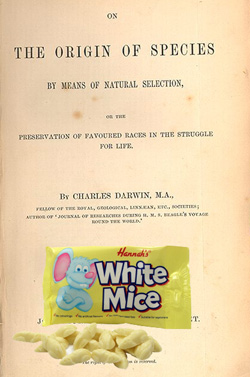
But it wasn’t candy that did it. I remember the name—Hot Pink. A lipstick, stuck down on the cover of a Teenage magazine; a vile colour but I peeled it off anyway, nipping out of the shop, my chest thumping wildly, thinking “whooohoo!” and then, “Oh God, is anyone behind me?” I chucked the swag in a nearby bin and rather than going onto a life of crime, went straight to church on bended knee. “Forgive me, Father. It’s been a while since my last confession but this is a good one, Father…” and vowing never again. And after five Hail Marys and a couple of rapid fire Our Fathers, I never did.
The next big heist was when I went up to Cambridge. Not so many lipsticks being “borrowed” among the dreaming spires, but other people’s ideas. My very clever boyfriend (Scholar, Double Starred First, Junior Fellow) was full of them and was somewhat bemused to find one his theories reproduced almost verbatim in another academic’s book, with barely a “thank you” or a footnote. Hmmm. I was incandescent. “This is just downright stealing, “ I cried, but my boyfriend just shrugged, took it on the chin,and got out of academia saying they were all a bunch of …!
So imagine how intriguing, when I started reading about Darwin years later, to discover allegations of theft and plagiarism. Could it be true? I couldn’t believe it, because for me, Darwin was a god. But what was all this controversy, then? All these allegations on the net, that at the heart of, On The Origin of Species – the most pivotal thesis in history – lay a dark and heinous crime. It was ike something out of a…ah ha. A novel!
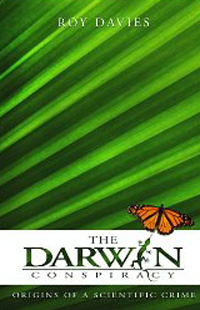 In The Darwin Conspiracy: Origins of a Scientific Crime, author Roy Davies claims to have unearthed evidence showing Darwin stole ideas from a man called Alfred Russel Wallace and that it was Wallace who should be credited as the Father of Evolution, not the man from Down House in Kent.
In The Darwin Conspiracy: Origins of a Scientific Crime, author Roy Davies claims to have unearthed evidence showing Darwin stole ideas from a man called Alfred Russel Wallace and that it was Wallace who should be credited as the Father of Evolution, not the man from Down House in Kent.
Davies accused Darwin of incorporating the revolutionary ideas of “Natural Selection” into his manuscript, claiming them as his own. The crucial evidence, it seemed, rested on Dutch mail boat records Davies had uncovered from experts at Leiden University, suggesting that Darwin had read Wallace’s ideas long before he admitted to doing so. Thus, he was able to work them into his thesis and present them as his own.
Shock! Horror!
But who was this man, I’d never heard of? Alfred Russel Wallace?
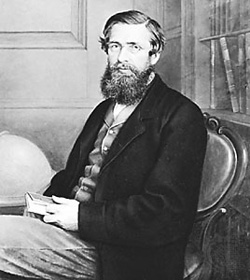
Darwin was rich, married to a Wedgewood, seriously well-connected, knowing the great botanists of the day such as Charles Lyell and Joseph Hooker. Whereas, Russel Wallace was from a humble background and was very much presented to the world by his snobby contemporaries as a collector not a thinker.
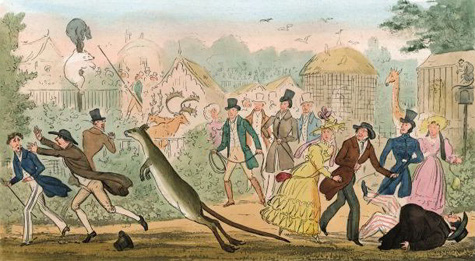
Hmmm.
Born in Llanbadoc, near Usk, in 1823, Russel Wallace became an explorer and a prolific collector of fossils, feathers, and beetles by the truck load, as he hacked his way through steaming jungles, wading through mud with his butterfly net and chasing after rare Birds of Paradise, hauling himself up far-flung mountain sides, slashing his arms on the rocks as he did so.
Experts at the Natural History Museum in London say he came up with the idea of evolution by natural selection at the same time as—but entirely independently of—Darwin, but has since been overshadowed by prejudices and unfairness, as is so often the way. While feverish with malaria on the Malay Archipelago in 1858, Wallace wrote to Darwin explaining his ideas. In his book, Roy Davies claimed that ideas contained in Wallace’s so-called Ternate paper were plagiarized by Darwin and that it was, “…a deliberate and iniquitous case of intellectual theft, deceit and lies.”
Darwin had begun work on the text of what became On the Origin of Species in the early 1840s but had dragged his heels, partly because he feared what Christian England would say, but also because he’d gone into a kind of lethargy following the death of a favourite child.
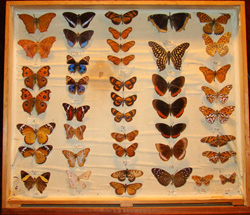
This is what Wallace wrote:
Why do some die and some live? The answer was clearly, that on the whole the best fitted live. From the effects of disease the most healthy escaped; from enemies, the strongest, swiftest, or the most cunning; from famine, the best hunters or those with the best digestion; and so on. Then it suddenly flashed upon me that this self-acting process would necessarily improve the race, because in every generation the inferior would inevitably be killed off and the superior would remain—that is, the fittest would survive.
Wish I’d been a fly on the wall when Darwin read that!
At the urging of his influential friends, but not without misgivings about the ethics of it all, Darwin wrote up his views on evolution in a paper presented alongside Wallace’s at the Linnean Society on 1st July 1858. On the Origin of the Species was published a year later. If I’m being very cheeky, technically, it was “knocked out” after gathering dust to be published in 1859. At the time, Darwin apparently thanked Wallace for his thoughts and the two men seemed to get on till they died (Wallace always very respectful of the “greater” man), but it’s Darwin who’s since been universally credited with the theory, while Wallace’s name has largely been forgotten.
The controversy has continued simmering, but recently, experts have painstakingly retraced the path of Wallace’s letters from Indonesia to England. They’ve proved that, in fact, Darwin received the letters when he said he had. He hadn’t lied at all. Both men had come up with the theory of Natural Selection in different parts of the world at the same time.
So then, perhaps not a crime after all but still, it’s very unfair to poor Alfred Russel Wallace. His vast collection of birds, butterflies, and beetles are everywhere in the Natural History rooms in London and inspired a number of passages in my own book, Devoured.
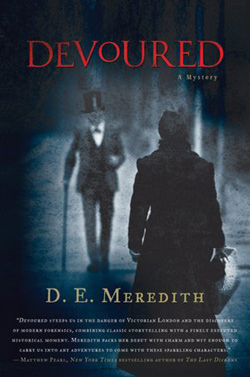 Alfred Russel Wallace also makes a brief appearance in Devoured (bushy beard and all), playing chess in a mountain lodge in Borneo with one of the characters (a specimen collector) called Benjamin Broderig. They discuss evolutionary ideas, of course.
Alfred Russel Wallace also makes a brief appearance in Devoured (bushy beard and all), playing chess in a mountain lodge in Borneo with one of the characters (a specimen collector) called Benjamin Broderig. They discuss evolutionary ideas, of course.
So, in the end, I feel I got to know Alfred Russel Wallace and his extraordinary work rather well. And for what it’s worth, I think we need to shift the spotlight back onto Wallace because history has proven to be unjust. He doesn’t have the fame he truly deserves. Thankfully, there’s work being carried out to do just that by The Alfred Wallace Society based at the Natural History Museum in London.
If you want to know more, you can read Wallace’s wonderful travel book—The Malay Archipelago. Or for more information on the life and works of this incredible naturalist and scientist, Alfred Russel Wallace, check out the Wallace website.
D.E. Meredith is the author of the historical crime series The Hatton and Roumande Mysteries, featuring the first forensic scientist, Professor Adolphus Hatton, and his trusty French morgue assistant, Albert Roumande.

Actually hi-tech research methods unveil a much darker story. Both Darwin and Wallace stole the entire theory from Patrick Matthew. And Matthew’s life-story is trully incredible. Oh, by the way, Lyell was a geologist not a botanist. You might want to check this out: http://www.bestthinking.com/thinkers/science/social_sciences/sociology/mike-sutton?tab=blog&blogpostid=21814